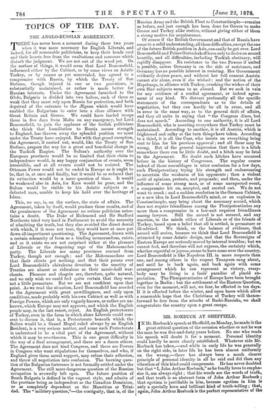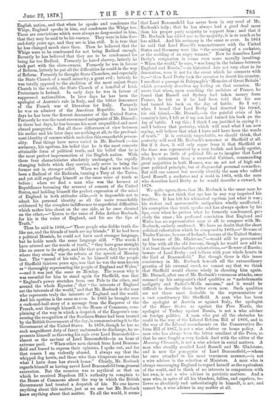MR. ROEBUCK AT SHEFFIELD.
IMr. Roebuck's speech at Sheffield, on Monday, hems& it the 1 great critical question of the occasion whether or not he was the man he was five-and-forty years before. No one who reads his speech will doubt it for a moment. Personal identity could hardly be more clearly established. Whatever side Mr. Roebuck has taken,—and while in early life he was generally on the right side, in later life he has been almost uniformly on the wrong,—there has always been a much clearer principle of personal identity in all he said and did than any vibration of this kind could compensate. He has never doubted but that " I, John Arthur Roebuck," as he fondly loves to empha- sise it, am always right ; that his words are the words of truth, and that truth is an abstract form of John Arthur Roebuck ; that egotism is justifiable in him, because egotism in him is only a specially keen and brilliant kind of truth-telling ; that, again, John Arthur Roebuck is the perfect representative of the
English nation, and that when he speaks and condemns the Whigs, England speaks in him, and condemns the Whigs too. These are convictions which were always so deep-rooted in him, that they may be said to be his essence. They were in him five- and-forty years ago, and they are in him still. It is true that he has changed much since then. Then he believed that the Whigs were to be condemned for not being Radical enough. Recently he has believed that they are to be condemned for being far too Radical. Formerly he hated slavery, latterly he took part with the slave-owners. Formerly he was in favour of Reform, latterly he put all the difficulties he could in the way of Reform. Formerly he thought State Churches, and especially the State Church of a small minority, a great evil ; latterly he was totally opposed to the abolition of the most unjust State Church in the world, the State Church of a handful of Irish Protestants in Ireland. In early days he was in favour of suppressed nationalities. In later days he has been the apologist of Austria's rule in Italy, and the bitter denouncer of the French war of liberation for Italy. Formerly he was an admirer of the American Republic. In later days he has been the fiercest denouncer of the United States. Formerly he was the most envenomed antagonist of Mr. Disraeli ; in these last days, he has become his most unqualified and most absurd panegyrist. But all these differences of view between his earlier and his later days are nothing at all, to the predomi- nant identity of essence which underlies this remarkable person- ality. Four things have never varied in Mr. Roebuck ;—his acrimony, his egotism, his belief that he is the most concrete attainable form of political truth, and his belief that he is the most perfect impersonation of the English nation. With these four characteristics absolutely unchanged, the rapidly changing beliefs which they survive, only serve to bring the former out in stronger relief. When we find a man who has been a Radical of the Radicals, turning a Tory of the Tories, and yet still regarding himself as the same voice of truth as before ; when we find a man who was the keenest of Republicans becoming the severest of censors of the United States, and holding himself the perfect expression of the mind of England in both attitudes alike,—it is impossible not to admit his personal identity as all the more remarkably evidenced by the complete indifference to superficial difficulties which makes him shout on the one side, as he once shouted on the other,—" Listen to the voice of John Arthur Roebuck, for his is the voice of England, and his are the lips of Truth."
Thus he said in 1868,—" Those people who dislike truth dis- like me, and the friends of truth are my friends." If he had been a political Messiah, he could not have used stronger language, but he holds much the same language still. " The words I have uttered are the words of truth," " they have gone straight like an arrow to its object, and like that arrow, they have stuck where they struck," was the refrain of the speech of Monday last. The " moral of his tale," as he himself told the people of Sheffield thirteen years ago, was that he was the man known as " thoroughly representing the people of England and Wales," —and it was just the same on Monday. The reason why it was essential for him to stand again for Sheffield, was that " England's power stretches from one Pole to the other, and around the whole Equator ;" that " the interests of England are the interests of the world," and that Mr. Roebuck is the man who represents truly the interests of England and the world. And his egotism is the same as ever. In 1863 he brought over a cock-and-bull story of a message from the Emperor of the French, sent through himself, to the House of Commons, com- plaining of the way in which a despatch of the Emperor's con- cerning the recognition of the Southern States had been treated by the British Government of the day, in communicating it to the Government of the United States. In 1878, though he has no such magnificent duty of fancy ambassador to discharge, he re- presents himself as throwing his wgis over Lord Beaconsfield— almost as the saviour of Lord Beaconsfield—in an hour of extreme peril. " When other men shrank from Lord Beacons- field and feared to express their opinions, I spoke out, and for that reason I am violently abused. I always say that the whipped dog howls, and those who thus vituperate me see that what I have done has struck home." Clearly, Mr. Roebuck regards himself as having saved Lord Beaconsfield from general execration. But the occasion was as mythical as that on which he received Napoleon al.'s authority to complain to the House of Commons about the way in which the British Government had treated a despatch of his. No one knows anything about this matter, just as no one but Mr. Roebuck knew anything about that matter. To all the world, it seems that Lord Beaconsfield has never been in any need of Mr. Roebuck's help ; that he has always had a good deal more than his proper party majority to support him ; and that if Mr. Roebuck has added one to the majority, it is as much as he has added. And his acrimony is the same as ever. In 1864 he said that Lord Russell's remonstrances with the United States and Germany were like " the screaming of a cockatoo, or the scolding of an angry woman." Now he describes Lord Derby's resignation in terms even more morally insulting. " When the world," he says, " was hung in the balance between England and Russia,"—an historical date not very clear in its denotation, were it not for the event which he connects with it,—" then Lord Derby took the occasion to desert his country. I recollect a passage in Dalrymple's 'Memoirs of Great Britain' which accurately describes my feeling on that occasion. He wrote that when, upon searching the archives of France, he found that Russell and Sydney had taken money from France, he felt as if he had been told that his son had turned his back on the day of battle. So I say ; when I heard that Lord Derby had deserted his friend, his old friend,—Mr. Disraeli,—in the painful crisis of his country's fate, I felt as if my son had turned his back on the lay of battle. I say this ; I think I am justified in saying it ; and I believe that posterity, which will read what I am now saying, will believe that what I have said have been the words of truth." It is certainly improbable, we should think, that posterity will read Mr. Roebuck's nonsense at Sheffield at all. But if it does, it will only argue from it that Sheffield at the time was represented by a very foolish and heady egotist, who knew so little of political life as to imagine that Lord Derby's retirement from a successful Cabinet, commanding great majorities in both Houses, was an act not of high and pure political principle, but of disgraceful personal cowardice. But still one cannot but morally identify the man who called Lord Russell a cockatoo and a scold in 1864, with the man who describes Lord Derby as he would describe a coward, in 1878.
We quite agree, then, that Mr. Roebuck is the same man he was. We do not think that age has in any way impaired his faculties. It has left his whimsical egotism just what it was ; his violent and unreasonable antipathies wholly unaffected ; his conception that truth speaks and has always spoken by his lips, even when he praises what he formerly condemned, pre- cisely the same ; his profound conviction that England and Wales has no representative man at all to compare with Mr. Roebuck, entirely unaltered. We have no doubt that the short political exhortation which he composed in 1869,—" Beware of Trades Unions; beware of Ireland; beware of the United States; and beware of Mr. Gladstone,"—would still be pronounced by him with all the old fervour, though he would now add to it at least these three further exhortations,—" Beware of Russia ; beware of Lord Derby ; and believe with your whole hearts in the Earl of Beaconsfield." But though there is this inner consistency in Mr. Roebuck beneath all the extraordinary gyraties of his external creed, we cannot say that we think that Sheffield would choose wisely in choosing him again. Mr. Disraeli, after one of Mr. Roebuck's venomous attacks, once summed up his antagonist's chief qualities as "melodramatic malignity and Sadler's-Wells sarcasm," and it would be difficult to describe them better even now. Such qualities are not those most desirable in the representative of a vast constituency like Sheffield. A man who has been the apologist of Austria as against Italy, the apologist of the Slave States as against the Free North, the apologist of Turkey against Russia, is not a wise adviser on foreign politics. A man who put all the obstacles he• could in the way of the Liberal Reform Bill of 1866, and in the way of the Liberal amendments on the Conservative Re- form Bill of 1867, is not a wise adviser on home policy. A man who has always been the bitter assailant of the Press, so. that he once fought a very foolish duel with the editor of the Morning Chronicle, is not a wise adviser in social matters. A man who steadily assailed Lord Russell and Mr. Gladstone, and is now the panegyrist of Lord Beaconsfield,—whom he once attacked in his most venomous manner,—is not a wise adviser in the selection of Ministers. A man who is always encouraging England to regard herself as the equivalent of the world, and to think of no interests in comparison with her own, is not a wise adviser in patriotic matters. And a man who, in spite of all his blunders, follies, and caprices, be- lieves so absolutely and unhesitatingly in himself, is not, and cannot be, a wise adviser in any matter at all.



































 Previous page
Previous page